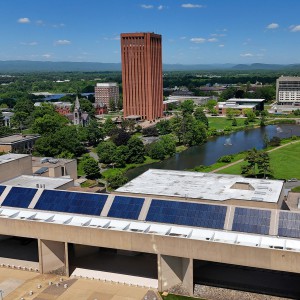Columnist Sara Weinberger: Republicans calling antisemitism over protests is bad-faith politics
| Published: 05-19-2024 1:35 PM |
When pro-Palestinian student protests in the U.S., prompted by the war in Gaza, began last fall, Republicans in Congress saw an opportunity to score points ahead of the November elections. Under the guise of protecting Jewish students from antisemitism, the House began investigating college protests in December, resulting in the resignations of the presidents of Harvard and the University of Pennsylvania. The irony of Republican lawmakers investigating antisemitism is akin to the fox guarding the henhouse. Republicans in the Trump era have been invoking conspiracy theories that promote antisemitism. Ascribing antisemitic tropes like “globalists” and “globalist elites,” to Hungarian American Jewish financier and Holocaust survivor, George Soros, Republicans, especially Trump, foster the myth that Jews are forming coalitions with BIPOC groups, LGBTQI communities, and other marginalized people as part of their plan to take over the U.S. government and eventually the world.
Known as The Great Replacement Theory, the term was used by neo–Nazi demonstrators in Charlottesville, who marched while chanting, “Jews will not replace us.” Republicans responded to this antisemitic attack with silence. Donald Trump, who responded by telling Americans there were “very fine people on both sides,” recently referred to the white supremacists who converged on Charlottesville as “a little peanut,” compared to the “tremendous hate” seen in the current protests.
Congressional leaders have also used the pro-Palestinian protests as another strategy for eliminating Diversity, Equity, and Inclusion programs (DEI), which have taken on increasing importance since the Supreme Court’s elimination of Affirmative Action. DEI has its shortcomings, one of which is its lack of inclusion of Jews as an oppressed group, but in the words of antisemitism expert, Stacy Burdett, who testified at a recent hearing on antisemitism, “… dismantling a system that protects marginalized minorities has nothing to do with the … fears of Jews who want to just live without harassment and antisemitism.” DEI is only one element of Republican disdain for institutions of higher education, which many, including those Republicans who graduated from Ivy League universities, view as “liberal bastions of progressive indoctrination.” (Vox, Dec. 21, 2023)
The pro-Palestinian protests have provided a vehicle for unifying the Republican Party against a common enemy, while deflecting from the trials (pun intended) of their 2024 presidential candidate. The hearings serve to paint a false image of a weak President Biden, unable to bring order to “elitist” college campuses filled with hateful pro-Palestinians on one side and fearful Jewish students on the other. Some Jewish students have been victimized by hate speech, threats, and occasionally physical violence. Some pro-Palestinian and Palestinian protesters have been subjected to arrests, police violence, and limits to free speech. By and large, the protests have been generally peaceful. Peaceful, however, is not newsworthy. The fact that many of the protesters are Jewish students and faculty, who want an end to the killing of civilians in Gaza and the return of Israeli hostages gets little attention.
Weaponizing antisemitism and Islamophobia to inflame divisions between Jews and Palestinians stokes animosity and fear on both sides. Republican Rep. Mike Johnson described the investigations of pro-Palestinian activity on college campuses as “a House-wide probe of antisemitism,” portraying these panels as protectors of the rights of Jews, while Rep. Jim Jordan, chair of the House Judiciary Committee, has sent letters to Secretary of State Blinken and Homeland Secretary Mayorkas to inquire whether visas issued to pro-Palestinian activist students on college campuses should be revoked. (Washington Post, May 2) Rep. Lauren Boebert, joining a group of GOP lawmakers at George Washington University’s pro-Palestinian encampment on May 1, gave a disturbing message, “I have seen signs here today: queer and trans folks for liberating Palestine; gays for Gaza; … lesbians for Palestine; Chinese for Palestine … This is not only disgusting but let me be very clear, almost every single person in this so-called liberated zone would be eviscerated by the very terrorists you are standing here supporting.”
That same day, the House passed the Antisemitism Awareness Act, with a bi-partisan vote of 320-91. The bill provides no funding to prevent antisemitism. Instead, it requires the Education Department to enforce anti-discrimination laws using the International Holocaust Remembrance Alliance’s definition of antisemitism, which equates criticism of Israel’s government and of Zionism with antisemitism, setting up a possible scenario in which Jewish students who criticize Israel’s government are labeled antisemitic. The Antisemitism Awareness Act is a chilling threat to Americans’ right to freedom of speech. Illinois representative Jan Schakowsky described the legislation as doing, ” … absolutely nothing to counter antisemitism and is another Republican attempt to pit the Jewish community and democrats against each other.”
The House antisemitism probes have extended to school districts, specifically, the liberal and diverse school districts of New York City, Berkeley, California, and Montgomery County, Maryland. Concerns about antisemitism within school systems exist locally, and school districts must be responsive. The leaders of the school districts being questioned acknowledge a rise in antisemitism. New York Chancellor David Banks told the panel, “We cannot simply discipline our way out of this problem. The true antidote to ignorance and bias is to teach … This convening, for too many people across America in education, feels like the ultimate ‘gotcha’ moment.”
The response to the protests from MAGA Republicans suggests a worrisome future for academic freedom, the right to free speech, and the preservation of a safe environment for all students.
Article continues after...
Yesterday's Most Read Articles
 Local ‘Hands Off!’ standouts planned as part of national effort
Local ‘Hands Off!’ standouts planned as part of national effort
 Long-vacant former Faces spot in Northampton gets new tenant
Long-vacant former Faces spot in Northampton gets new tenant
 Here come the sweetness: Four new businesses prepping to open in downtown Northampton
Here come the sweetness: Four new businesses prepping to open in downtown Northampton
 State senators organize Trump defense: Comerford a leader on Response 2025 initiative
State senators organize Trump defense: Comerford a leader on Response 2025 initiative
 Five UMass Amherst students have visas, student status revoked
Five UMass Amherst students have visas, student status revoked
 Hatfield Select Board removes elected Housing Authority member
Hatfield Select Board removes elected Housing Authority member
Sara Weinberger of Easthampton is a professor emerita of social work and writes a monthly column. She can be reached at columnists@gazettenet.com.








 Guest columnist Dr. Shelley Berkowitz: Single-payer health care just needs vote
Guest columnist Dr. Shelley Berkowitz: Single-payer health care just needs vote Guest columnist John Saveson: Use your spending power for the planet
Guest columnist John Saveson: Use your spending power for the planet Betty Ussach-Schwartz: The greatest grift of all
Betty Ussach-Schwartz: The greatest grift of all Jerry Halberstadt: Problems at Northampton Housing Authority seen in many housing programs
Jerry Halberstadt: Problems at Northampton Housing Authority seen in many housing programs
